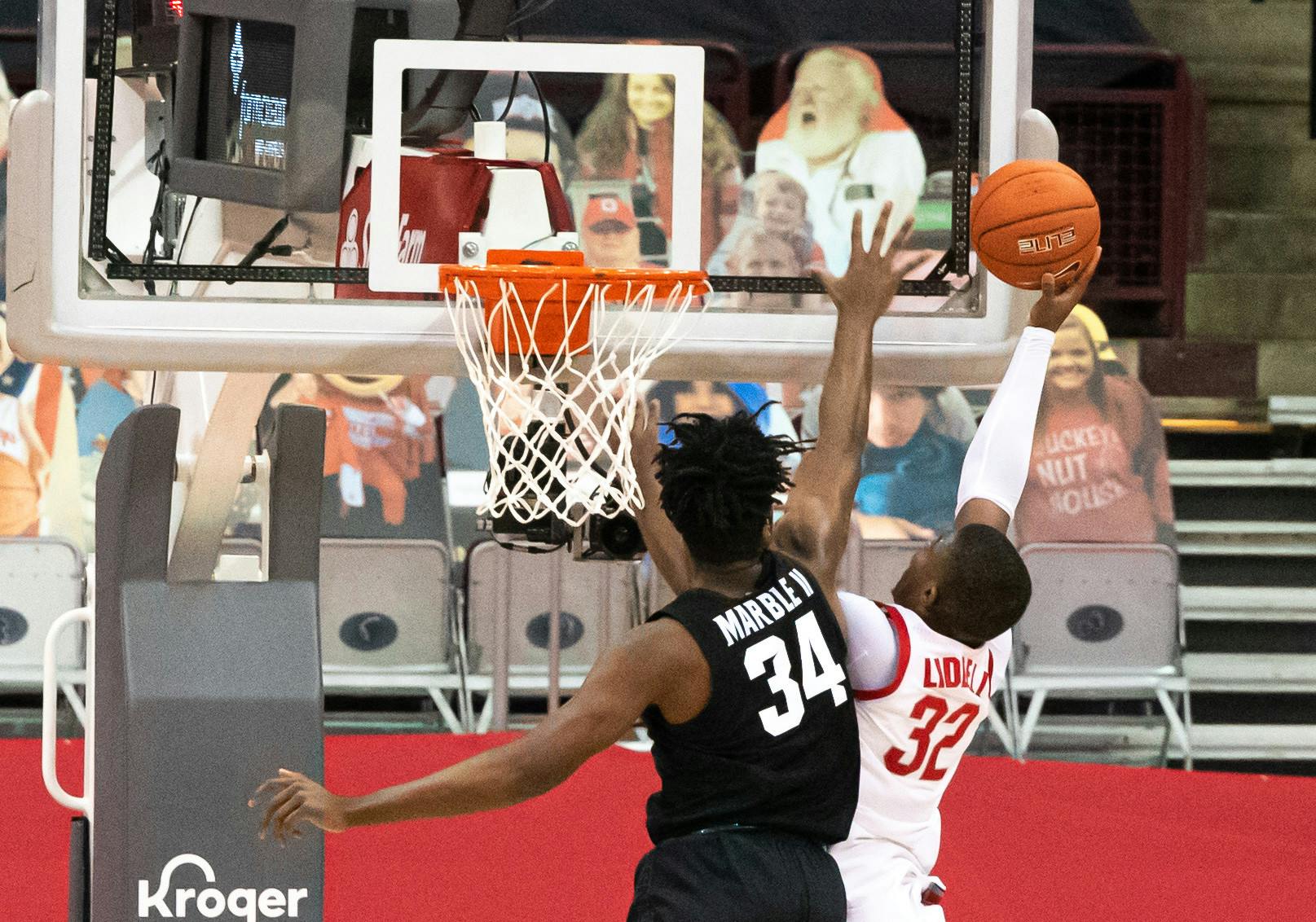As a collective society, we really need to start thinking before we hit send.
What does it get you to be rude to another person online, regardless of their status?

Sophomore forward Julius Marble II (34) blocks a shot attempt made by Ohio State's E.J. Liddell (32) in the second half. The Buckeyes swept the Spartans, 79-62, at OSU's Schottenstein Center on Jan. 31, 2021.
As a collective society, we really need to start thinking before we hit send.
What does it get you to be rude to another person online, regardless of their status?
In what ways do you benefit from hiding behind a screen and bullying somebody who is doing something that you probably aren’t even capable of doing?
Enlighten me, please.
On Saturday, Ohio State men’s basketball player E.J. Liddell received a number of frightening and threatening messages riddled with slurs from multiple anonymous Instagram users. He posted screenshots on Twitter, where he received a lot of support from other basketball players and fans around the country.
“You so f------ terrible bruh I swear to god I’m a get a f------ hacker so I can find out exactly where you be at so I can smack the s--- out you personally I put that on my LIFE,” one message said.
“You are such a f------ disgrace," another said. "Don’t ever show your face at Ohio state. We hate you. I hope you die I really do."
Proper grammar doesn’t seem to exist in the realm of cyberbullying, but hey, law enforcement doesn’t seem to care either way. Over the last three days, OSU has thankfully started an investigation into the two disgruntled fans, according to ESPN.
How pathetic do you have to be to go online, search up someone’s username, let alone the name of an unpaid college student-athlete and type out a hate message over a measly three-point loss (which, by the way, is not too uncommon in a game of basketball)?
Is this sport that important to you? Does dehumanizing someone make you feel powerful?
As a collective society, we have to remember that there is another human being on the other end of every screen. Your comment may not matter to you, it may just be a momentary outburst and you will probably forget what you were mad over within a matter of minutes, but it will stick with the person who received it forever.
One of my professors told me they received a hate email once that they chose to reply to. When they did so, the Internet troll responded back in shock and panic, stating they didn’t know anyone would get the message, let alone read it and react.
How immature do you have to be, honestly?
Michigan State men’s basketball players Rocket Watts and Malik Hall replied to Liddell’s tweet in disappointment.
Watts' tweet was later deleted, but Hall makes a point. Nobody loves the game more than the student-athletes themselves. There’s a reason they’re the ones on the court and you’re not.
We need to start holding people more accountable for their actions, regardless of their status. What these two Internet trolls sent to Liddell was not, and will never be, OK.
Put yourself in his shoes. Would you like to receive the type of messages you’re sending?
Support student media! Please consider donating to The State News and help fund the future of journalism.
According to the Megan Meier Foundation, approximately 34% of students report experiencing some form of cyberbullying during their lifetime. Over 60% of students who experience it have reported that it immensely impacted their ability to learn and feel safe on campus.
In total, 59% of U.S. teens have been bullied or harassed online and over 90% believe it’s a major problem for people their age, according to the study.
The Foundation also said that targets of cyberbullying are at a greater risk than others of both self-harm and suicidal behaviors. Approximately 18%, or 1-in-4 girls and 1-in-10 boys, report self-harming at least once, and 6% report they’ve digitally self-harmed — shared hurtful content about oneself online.
Targets of cyberbullying are two times more likely to attempt suicide, which is the second leading cause of death for individuals 10-34 years of age, the Centers for Disease Control and Prevention reported in 2019.
Imagine someone taking time out of their day to cyberbully a 20-year-old — again, unpaid — athlete because he missed, what, a free throw? Get over it.
Liddell added a secondary tweet that said, “Comments don’t get to me but I just wanna know why. I’ve never done anything to anyone in my life to be approached like this.” He also expressed appreciation for the Buckeyes fanbase.
My condolences go out to you at this time, Liddell. As someone who too receives bouts of hate messages simply for holding the title and job position that I do, I know the psychological warfare they cause can be tumultuous.
Don’t let the Internet trolls strip you of what you’ve rightfully earned. You are worth more than what they make you out to be. We need to start taking this seriously.